1. The more regular your periods, the better your hormones are balanced
 image source: reddit.com
image source: reddit.com
Consistent menstrual cycles typically suggest good hormonal balance. Regularity in menstruation is a reflection of the body's intricate hormonal orchestration, particularly involving estrogen and progesterone. When hormonal levels are balanced, the uterine lining builds up predictably each month and sheds in a timely manner.
2. More irregular periods may be caused by underlying health issues
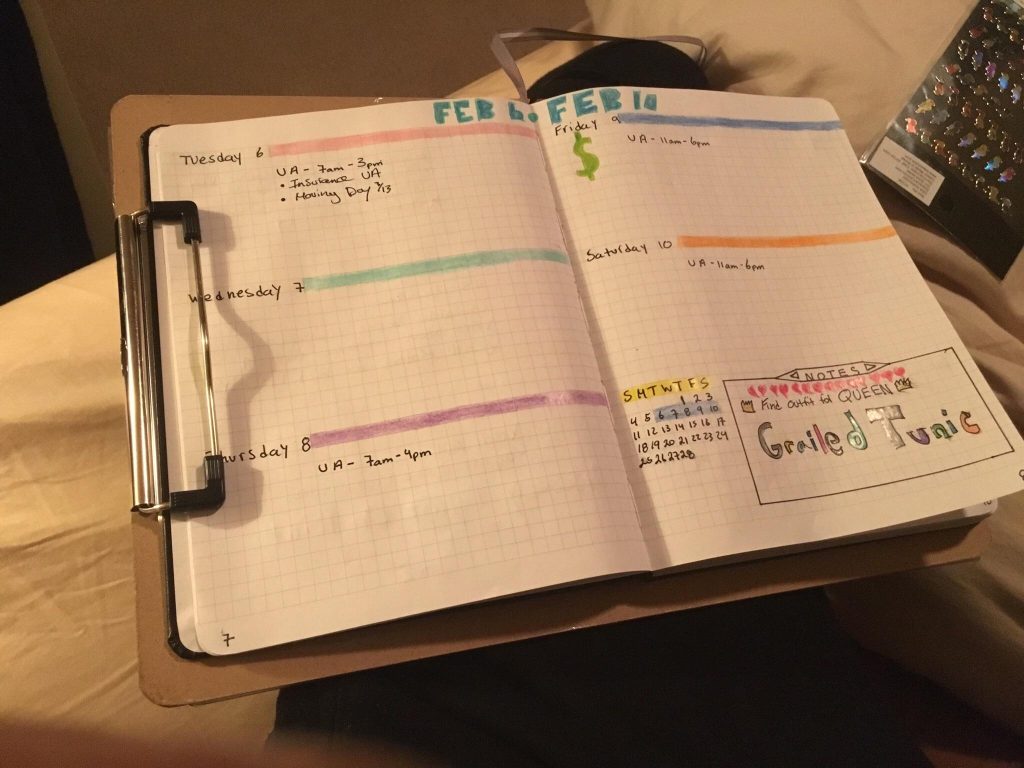 image source: reddit.com
image source: reddit.com
Irregular periods may indicate hormonal imbalances or underlying health issues. While occasional irregularities in the menstrual cycle are common and often benign, persistent irregularities can be a sign of an underlying problem. Hormonal imbalances can disrupt the normal menstrual pattern.
3. A sudden decrease in flow might suggest a dysfunction
 image source: reddit.com
image source: reddit.com
Abrupt changes in flow consistency could signify hormonal imbalances or other health concerns. The consistency of menstrual flow, including its volume and texture, can provide valuable insights into a woman's reproductive health. While it's normal for menstrual flow to vary slightly from cycle to cycle, sudden or significant changes may indicate an underlying issue.
4. Unusually short or long periods may mean an imbalance
 image source: reddit.com
image source: reddit.com
Unusually long or short periods might be indicative of hormonal imbalances or health issues. The duration of menstrual bleeding, typically lasting between 2 to 7 days, can vary among individuals and may change over time. However, significant deviations from this norm may warrant medical attention, whether long or short periods.
5. Extreme menstrual pain may be fibroids
 image source: reddit.com
image source: reddit.com
Severe menstrual pain could be a sign of conditions like endometriosis or fibroids. While some degree of discomfort or cramping during menstruation is common for many women, severe or debilitating pain, known as dysmenorrhea, is not normal and may indicate an underlying health problem.
6. Spotting between periods? You might have a cervical issue
 image source: reddit.com
image source: reddit.com
Spotting between periods may suggest hormonal imbalances or cervical issues. While occasional spotting between periods is common and often benign, persistent or abnormal spotting may indicate an underlying health concern. Hormonal imbalances, such as fluctuations in estrogen and progesterone levels, can disrupt the normal menstrual cycle and lead to irregular bleeding.
7. Heavy bleeding may indicate polyps
 image source: reddit.com
image source: reddit.com
Excessive bleeding could indicate conditions like fibroids, polyps, or bleeding disorders. Menstrual bleeding that is significantly heavier than usual, requiring frequent changing of pads or tampons, can be concerning and may indicate an underlying health issue. Conditions such as uterine fibroids, noncancerous growths in the uterus, or endometrial polyps can cause heavy menstrual bleeding.
8. You could have a nutritional deficiency if you only bleed light
 image source: reddit.com
image source: reddit.com
Very light periods might be a sign of nutritional deficiencies. While variations in menstrual flow are normal, consistently light periods that require minimal sanitary protection may indicate nutritional deficiencies, particularly of iron or vitamin B12, which can affect the production of blood cells and result in light periods.
9. Having large blood clots may mean problems with coagulation
 image source: reddit.com
image source: reddit.com
Passing large blood clots could indicate hormonal issues or problems with blood coagulation. Blood clots during menstruation are a common occurrence and are typically a result of the blood's natural clotting process. However, passing large or numerous blood clots, particularly consistently over several cycles, may warrant medical attention.
10. Dark blood could mean your menstrual shedding is taking longer
 image source: reddit.com
image source: reddit.com
Unusual colors like very dark blood could indicate health issues. While menstrual blood is typically bright red in color, variations in color can sometimes occur and may provide insights into a woman's health. Very dark or almost black menstrual blood may indicate that it has been in the uterus for a longer period, potentially due to slower shedding of the uterine lining.
11. Light blood might indicate you have anemia
 image source: reddit.com
image source: reddit.com
On the other hand, pale or light-colored menstrual blood may suggest lower levels of hemoglobin, which could be indicative of anemia or nutritional deficiencies. Monitoring changes in the color of menstrual blood can help individuals identify potential health concerns and seek appropriate medical evaluation and treatment.
12. Hormonal fluctuations might be triggering your migraines
 image source: reddit.com
image source: reddit.com
Migraines associated with menstruation might suggest hormonal fluctuations. Menstrual migraines are headaches that occur in relation to a woman's menstrual cycle, typically in the days leading up to or during menstruation. These migraines are often triggered by hormonal fluctuations, particularly changes in estrogen levels.
13. Severe mood swings might be PMDD (premenstrual dysphoric disorder)
 image source: reddit.com
image source: reddit.com
Fluctuations in estrogen and progesterone levels during the menstrual cycle can affect neurotransmitter levels in the brain, including serotonin and dopamine, which play key roles in regulating mood. Additionally, hormonal imbalances can contribute to symptoms of premenstrual dysphoric disorder (PMDD), a severe form of premenstrual syndrome (PMS).
14. Extreme fatigue could mean anemia or other health issues
 image source: reddit.com
image source: reddit.com
One common cause of fatigue during menstruation is iron-deficiency anemia, which can develop when menstrual bleeding is heavy and results in a loss of iron-rich blood. Anemia can lead to symptoms such as weakness, lethargy, and difficulty concentrating. Other potential causes of fatigue during menstruation include hormonal imbalances.
15. Period acne could be too much testosterone
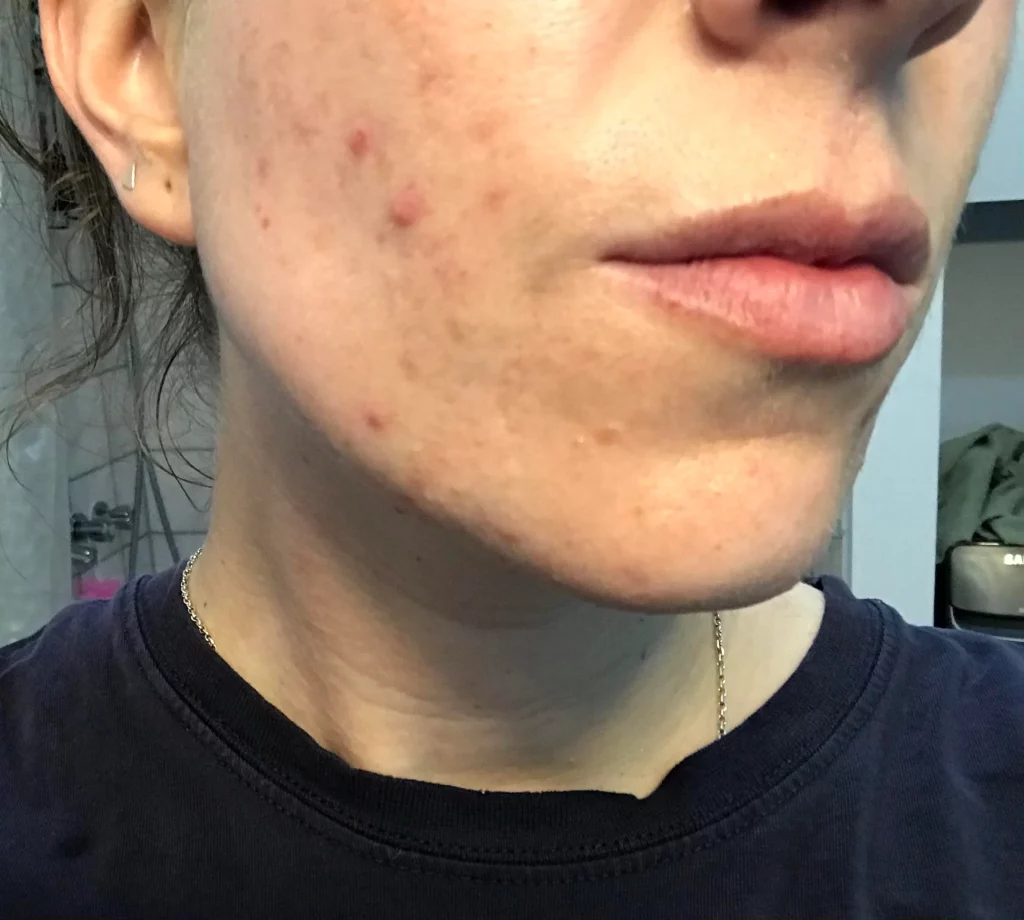 image source: reddit.com
image source: reddit.com
Acne worsening around menstruation might indicate hormonal fluctuations. Many women experience changes in their skin, including acne flare-ups, in the days leading up to or during menstruation. These changes are often driven by hormonal fluctuations, particularly increases in androgens such as testosterone, which can stimulate the production of sebum (oil) in the skin and lead to clogged pores and acne breakouts.
16. Having digestive issues can be down to too much hormonal change
 image source: reddit.com
image source: reddit.com
Diarrhea or constipation during menstruation could be linked to hormonal changes. Changes in bowel habits, such as diarrhea or constipation, are common complaints among women during menstruation and are often attributed to hormonal fluctuations and the effects of prostaglandins, hormone-like substances that regulate various bodily processes.
17. Tender breasts can be down to an increase in estrogen
 image source: reddit.com
image source: reddit.com
Breast tenderness, also known as mastalgia, is a common symptom experienced by many women in the days leading up to menstruation (premenstrual phase) and often resolves once menstruation begins. This breast tenderness is primarily attributed to hormonal changes, particularly increases in estrogen and progesterone levels, which can cause the breast tissue to swell and become more sensitive.
18. Changes in libido are down to the shifts between testosterone and estrogen
 image source: reddit.com
image source: reddit.com
Many women experience variations in their sex drive throughout the menstrual cycle, with libido often peaking around ovulation (mid-cycle) and fluctuating in the days leading up to menstruation (premenstrual phase). These changes in libido are primarily driven by hormonal fluctuations, particularly shifts in estrogen and testosterone levels, which influence sexual desire and arousal.
19. If you have more joint pain, you might have a bigger shift in estrogen
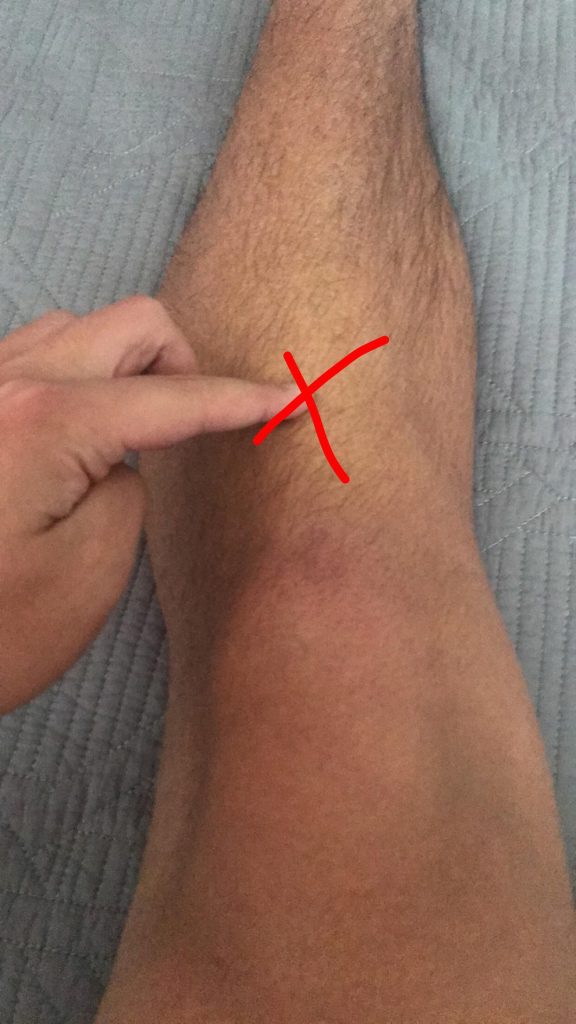
image source: reddit.com
While the exact cause of menstrual-related joint pain is not fully understood, hormonal fluctuations, particularly changes in estrogen and progesterone levels, are believed to play a role. Estrogen has anti-inflammatory effects on the joints, and fluctuations in estrogen levels during the menstrual cycle may contribute to increased joint inflammation and pain in susceptible individuals.
20. Do you have food cravings? It could be down to serotonin changes
 image source: reddit.com
image source: reddit.com
These appetite changes are believed to be influenced by hormonal fluctuations, particularly shifts in estrogen, progesterone, and serotonin levels, which can affect hunger hormones such as ghrelin and leptin. Additionally, changes in mood, energy levels, and physical discomfort during the menstrual cycle can impact appetite and food preferences.
21. Insomnia? You have your hormones to thank for that
 image source: reddit.com
image source: reddit.com
Many women experience sleep disturbances in relation to their menstrual cycle, with symptoms often occurring in the days leading up to menstruation (premenstrual phase) and during menstruation itself. These sleep disturbances can include difficulty falling asleep, staying asleep, or waking up feeling unrefreshed. Hormonal fluctuations, particularly changes in estrogen and progesterone levels, are believed to play a role in menstrual-related insomnia.
22. Anxiety or depression could be down to brain chemistry changing during that time of the month
 image source: reddit.com
image source: reddit.com
Mood changes can include symptoms of anxiety, depression, irritability, or mood swings. Hormonal fluctuations, particularly changes in estrogen, progesterone, and serotonin levels, are believed to play a role in menstrual-related mood changes. Estrogen and progesterone influence neurotransmitter levels and brain chemistry.
23. A thyroid problem might be causing your irregular periods
 image source: reddit.com
image source: reddit.com
Irregular periods can sometimes indicate thyroid problems. Irregular periods, including changes in cycle length, frequency, or flow consistency, can sometimes be a sign of thyroid problems such as hypothyroidism (underactive thyroid) or hyperthyroidism (overactive thyroid). Thyroid hormones influence the production and function of reproductive hormones.
24. Extremely painful and heavy periods could be adenomyosis
 image source: reddit.com
image source: reddit.com
Adenomyosis is a condition in which the tissue lining the uterus (endometrium) grows into the muscular wall of the uterus (myometrium), causing the uterus to become enlarged, tender, and boggy. Common symptoms of adenomyosis include severe menstrual cramps, prolonged or heavy menstrual bleeding (menorrhagia), pelvic pain or pressure, and pain during intercourse.
25. Pelvic inflammatory disease (PID) might be causing you to miss your monthly due date
 image source: reddit.com
image source: reddit.com
Irregular periods might be a symptom of PID. Pelvic inflammatory disease (PID) is a bacterial infection of the female reproductive organs, including the uterus, fallopian tubes, and ovaries. PID is typically caused by sexually transmitted infections (STIs) such as chlamydia or gonorrhea, although other types of bacteria can also cause the infection.
26. Blood spotting might be an indication of cancer

image source: reddit.com
Cervical cancer and uterine (endometrial) cancer are two types of gynecological cancers that can affect women's reproductive organs. Abnormal vaginal bleeding, including irregular bleeding between periods, after intercourse, or after menopause, is one of the most common symptoms of both cervical and uterine cancer. Other symptoms may include pelvic pain or pressure, pain during intercourse or abnormal vaginal discharge.
27. If you suffer from pelvic pain, it might be ovarian cysts
 image source: reddit.com
image source: reddit.com
Irregular periods or pelvic pain might indicate ovarian cysts. Ovarian cysts are fluid-filled sacs that develop on the ovaries, and while many cysts are harmless and resolve on their own, some can cause symptoms such as irregular menstrual cycles, pelvic pain, or discomfort. Irregular periods may occur if a cyst interferes with the normal hormonal regulation of the menstrual cycle.
28. An inconsistent flow might be down to stress
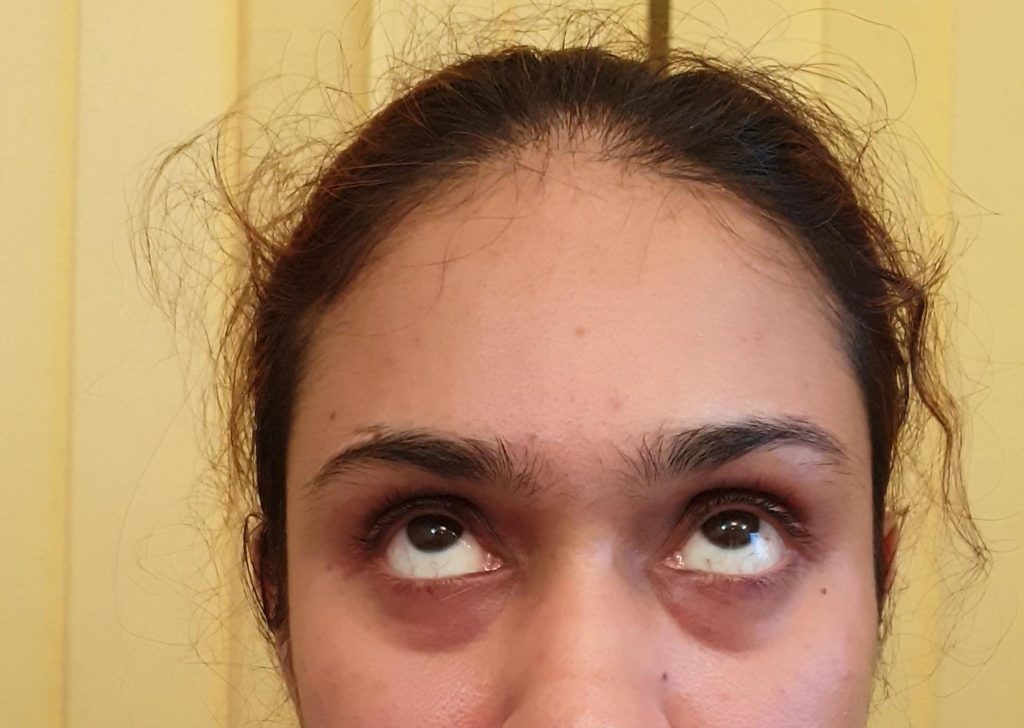 image source: reddit.com
image source: reddit.com
Chronic or high levels of stress can disrupt the hypothalamic-pituitary-adrenal (HPA) axis, which regulates the production of hormones such as cortisol and adrenaline. Dysregulation of the HPA axis can lead to alterations in the production and balance of reproductive hormones such as estrogen and progesterone, which may result in changes or even missed periods.
29. If you miss periods altogether, it might be an eating disorder
 image source: reddit.com
image source: reddit.com
Extreme weight loss, as seen in conditions such as anorexia nervosa or excessive dieting, can lead to disruptions in ovulation or the suppression of reproductive hormone production, resulting in irregular or absent periods (amenorrhea). Conversely, significant weight gain, as seen in conditions such as obesity or rapid weight gain due to hormonal imbalances, can also affect menstrual cycles.
30. Irregular periods? You might actually be moving too much
 image source: reddit.com
image source: reddit.com
Intense physical activity, particularly when combined with inadequate calorie intake or high levels of stress, can disrupt the body's hormonal balance and menstrual cycles. Exercise-induced menstrual irregularities, commonly referred to as exercise-associated amenorrhea, may manifest as irregular periods, missed periods, or even complete cessation of menstruation.
31. If your periods aren't regular, get a diabetes test
 image source: reddit.com
image source: reddit.com
Diabetes is a chronic condition characterized by high levels of blood glucose (sugar) resulting from defects in insulin production, insulin action, or both. Uncontrolled diabetes, particularly type 1 diabetes or poorly managed type 2 diabetes, can lead to alterations in hormonal balance and menstrual cycles.
32. High blood pressure could be messing with your periods

image source: reddit.com
While the direct relationship between hypertension and menstrual irregularities is not fully understood, research suggests that hormonal imbalances associated with hypertension may contribute to disruptions in the menstrual cycle. Elevated blood pressure can affect hormonal regulation.
33. Liver or kidney problems could be causing less-than-regular periods
 image source: reddit.com
image source: reddit.com
Liver and kidney diseases, including conditions such as hepatitis, cirrhosis, or chronic kidney disease, can impact various bodily functions, including hormone metabolism and clearance. Disruptions in liver or kidney function can affect the body's ability to metabolize and eliminate hormones such as estrogen and progesterone.
34. If your cycle lengths and flow are always changing, check any medication you're taking
 image source: reddit.com
image source: reddit.com
Some medications can affect menstrual cycles. Many medications, including prescription drugs, over-the-counter medications, and supplements, can have side effects that impact hormonal balance and menstrual regularity. Side effects of these medications may include changes in cycle length, frequency, or flow consistency.
35. The biggest period changes can be down to your birth control
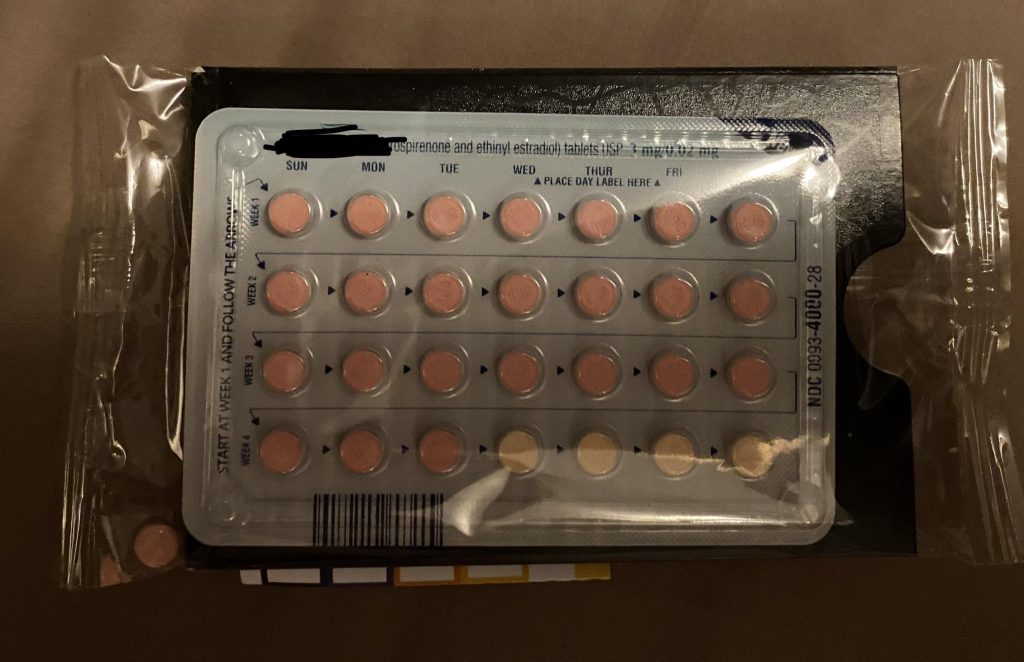 image source: reddit.com
image source: reddit.com
Hormonal contraceptives, including birth control pills, patches, injections, or intrauterine devices (IUDs), work by altering hormone levels to prevent ovulation and pregnancy. While hormonal contraceptives are highly effective in preventing pregnancy, they can also impact menstrual cycles and flow patterns. Common changes in menstrual patterns associated with hormonal contraceptives may include lighter or shorter periods.
36. If you're reaching a certain age, period changes could be menopause
 image source: reddit.com
image source: reddit.com
Menstrual irregularities are common during perimenopause and may include changes in cycle length, frequency, or flow consistency, as well as other symptoms such as hot flashes, night sweats, mood changes, or vaginal dryness. Menstrual irregularities during perimenopause are primarily driven by fluctuations in estrogen and progesterone levels as ovarian function declines.
37. If your cycle length is always changing, it might be a food allergy
 image source: reddit.com
image source: reddit.com
While the direct relationship between foods or sensitivities and menstrual irregularities is not fully understood, research suggests that immune system dysfunction and inflammation associated with allergies or sensitivities may impact hormonal balance and reproductive health. Food allergies or sensitivities can trigger immune responses and inflammatory reactions in the body, which may disrupt hormone production.
38. Check for environmental factors if your cycles are never the same
 image source: reddit.com
image source: reddit.com
Environmental factors such as endocrine-disrupting chemicals (EDCs), heavy metals, pesticides, and air pollutants have been linked to disruptions in hormonal balance and menstrual cycles. EDCs, for example, can interfere with the body's endocrine system, which regulates hormone production and signaling, leading to alterations in estrogen, progesterone, and other reproductive hormones.
39. If you're missing a cycle, check whether you have sleep apnea
 image source: reddit.com
image source: reddit.com
Sleep disorders such as obstructive sleep apnea (OSA) can disrupt the body's circadian rhythm, which regulates sleep-wake cycles and hormone production. Disruptions in the circadian rhythm can affect the production and balance of hormones such as cortisol, melatonin, and reproductive hormones, including estrogen and progesterone, which may impact menstrual cycles.
40. Check in with a doctor about autoimmune disorders if your period flow is always changing
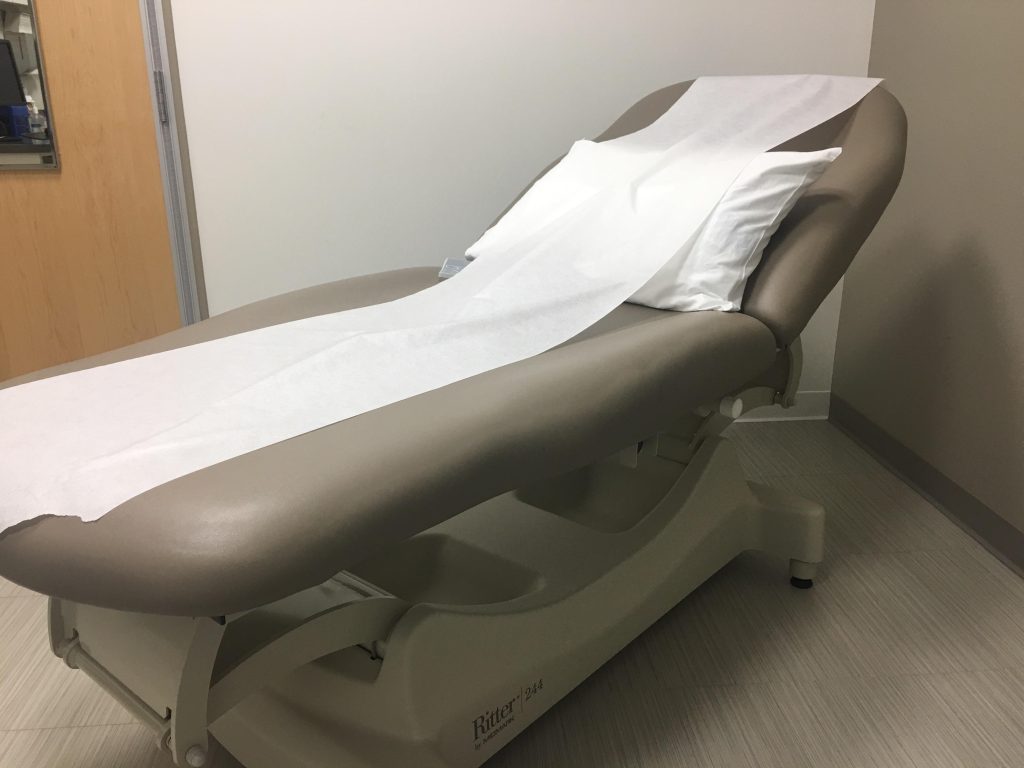 image source: reddit.com
image source: reddit.com
Autoimmune conditions can impact various bodily functions, including hormonal regulation and reproductive health. For example, autoimmune thyroid disease can disrupt thyroid hormone production, which plays a crucial role in regulating metabolism and menstrual cycles. Thyroid dysfunction, characterized by hypo- or hyperthyroidism, can lead to menstrual irregularities such as changes in flow consistency.
41. Your family history might be affecting how fertile you are

image source: reddit.com
Genetic factors can influence various aspects of reproductive health, including menstrual cycles, hormone metabolism, and fertility. Individuals with a family history of certain conditions such as polycystic ovary syndrome (PCOS), endometriosis, thyroid disorders, or genetic syndromes may be at increased risk of experiencing menstrual irregularities or other reproductive health issues themselves.
42. If you're never on time, it could be down to a gut imbalance
 image source: reddit.com
image source: reddit.com
The gut microbiota, composed of trillions of microorganisms that inhabit the gastrointestinal tract, plays a crucial role in regulating various physiological processes, including immune function, metabolism, and hormone production. Disruptions in gut microbiota composition, known as dysbiosis, have been linked to reproductive health issues.
43. Huge inconsistencies in your periods need medical evaluation
 image source: reddit.com
image source: reddit.com
A thorough assessment by a healthcare provider can help identify any underlying health issues or imbalances contributing to menstrual irregularities and guide appropriate treatment and management strategies to promote overall health and well-being. Regular monitoring of menstrual cycles and communication with a healthcare provider can help ensure timely intervention and optimal reproductive health.
44. Adrenal disorders might be disrupting your period hormones
 image source: reddit.com
image source: reddit.com
Conditions like Addison's disease, characterized by insufficient production of adrenal hormones such as cortisol and aldosterone, or Cushing's syndrome, marked by excessive cortisol production, can significantly disrupt hormone balance and impact menstrual cycles, causing changes in your periods.
45. Your tips for a healthier period: keep a balanced diet
 image source: reddit.com
image source: reddit.com
Consuming a diet rich in fruits, vegetables, whole grains, lean proteins, and healthy fats can support overall health, including menstrual health. Nutrient-dense foods provide essential vitamins and minerals necessary for hormone production, blood flow regulation, and overall well-being. Aim to include foods high in iron, calcium, magnesium, and vitamin B6.
46. Stay hydrated, as always!
 image source: reddit.com
image source: reddit.com
Proper hydration is essential for maintaining optimal blood flow and eliminating toxins from the body, which can contribute to healthier periods. Aim to drink plenty of water throughout the day, especially during menstruation, to stay hydrated and support overall menstrual health. Herbal teas and hydrating foods like fruits and vegetables can also contribute to your fluid intake.
47. Manage your stress in a better way

image source: reddit.com
Chronic stress can disrupt hormonal balance and exacerbate menstrual symptoms such as cramping, mood swings, and irregular periods. Incorporate stress-reducing activities into your daily routine, such as meditation, deep breathing exercises, yoga, or spending time outdoors. Prioritizing self-care and relaxation can help support a healthier menstrual cycle.
48. Engage in regular exercise
 image source: reddit.com
image source: reddit.com
Engaging in regular physical activity can help regulate hormones, improve circulation, and reduce menstrual symptoms. Aim for at least 30 minutes of moderate-intensity exercise most days of the week, such as brisk walking, cycling, swimming, or dancing. Exercise releases endorphins, which can help alleviate menstrual discomfort and improve mood.
49. Track your menstrual cycle
 image source: reddit.com
image source: reddit.com
Keeping track of your menstrual cycle, including the start and end dates of your period, as well as any symptoms or changes in flow consistency, can help you better understand your body and identify any irregularities or abnormalities. There are many smartphone apps available for menstrual tracking, or you can use a traditional calendar or diary.
50. Be honest about your own experience
 image source: reddit.com
image source: reddit.com
There's nothing worse than having to hide how bad your period pains are, your struggles with a heavy flow, or coming on at a different time than you expected. Be sure to be honest with others - and yourself - regarding what you need on your period, whether that's stronger pain killers, a larger pad or a sick day!
 image source: reddit.com
image source: reddit.com image source: reddit.com
image source: reddit.com image source: reddit.com
image source: reddit.com image source: reddit.com
image source: reddit.com image source: reddit.com
image source: reddit.com image source: reddit.com
image source: reddit.com image source: reddit.com
image source: reddit.com image source: reddit.com
image source: reddit.com image source: reddit.com
image source: reddit.com image source: reddit.com
image source: reddit.com image source: reddit.com
image source: reddit.com image source: reddit.com
image source: reddit.com image source: reddit.com
image source: reddit.com image source: reddit.com
image source: reddit.com image source: reddit.com
image source: reddit.com image source: reddit.com
image source: reddit.com image source: reddit.com
image source: reddit.com image source: reddit.com
image source: reddit.com
 image source: reddit.com
image source: reddit.com image source: reddit.com
image source: reddit.com image source: reddit.com
image source: reddit.com image source: reddit.com
image source: reddit.com image source: reddit.com
image source: reddit.com image source: reddit.com
image source: reddit.com
 image source: reddit.com
image source: reddit.com image source: reddit.com
image source: reddit.com image source: reddit.com
image source: reddit.com image source: reddit.com
image source: reddit.com image source: reddit.com
image source: reddit.com
 image source: reddit.com
image source: reddit.com image source: reddit.com
image source: reddit.com image source: reddit.com
image source: reddit.com image source: reddit.com
image source: reddit.com image source: reddit.com
image source: reddit.com image source: reddit.com
image source: reddit.com image source: reddit.com
image source: reddit.com image source: reddit.com
image source: reddit.com
 image source: reddit.com
image source: reddit.com image source: reddit.com
image source: reddit.com image source: reddit.com
image source: reddit.com image source: reddit.com
image source: reddit.com image source: reddit.com
image source: reddit.com
 image source: reddit.com
image source: reddit.com image source: reddit.com
image source: reddit.com image source: reddit.com
image source: reddit.com